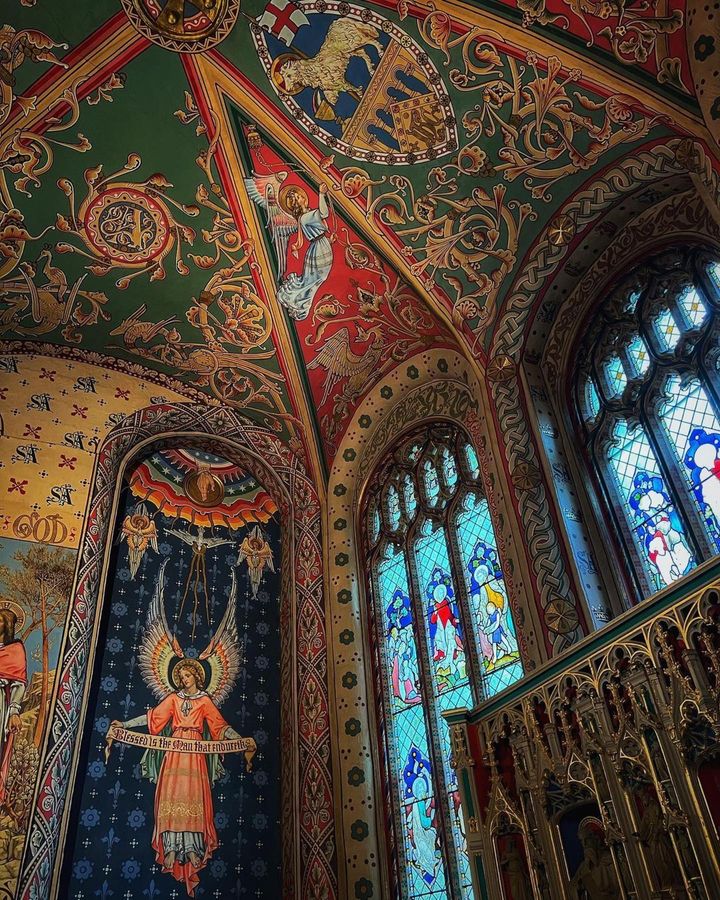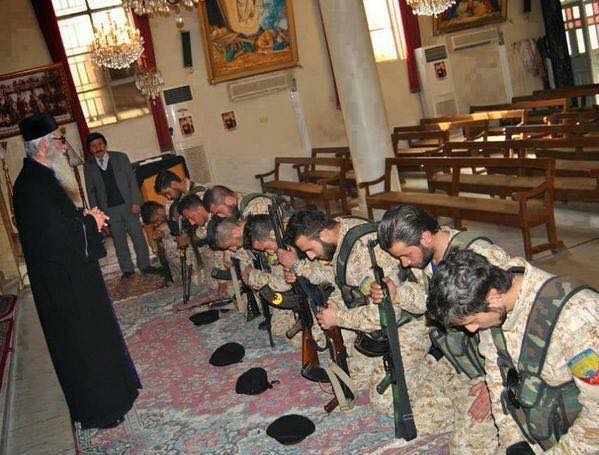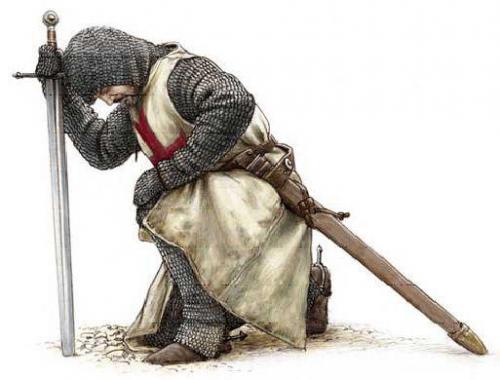A Discussion With the Anglo-Calvinists
 Embryo Parson Posted on
Embryo Parson Posted on  Wednesday, March 2, 2016 at 02:21PM
Wednesday, March 2, 2016 at 02:21PM I have several Anglican friends, mostly at Facebook, who belong to the Anglo-Calvinist party and do much kvetching about solving the Anglican identity problem by returning to a confessionalist understanding of the Anglican formumaries, which confessionalist understanding ought to be theologically Reformed since the framers of the formularies had come under the spell of early Reformed theology. Some of them go as far as insisting on observing every jot and tittle of the Homilies, which means among other things an almost total prohibition on artwork in the church, and even things like the Advent wreath.
A few days ago one of these friends posted something on his Facebook page about the ongoing discussions between the ACNA, the Lutheran Church Missouri Synod and the Lutheran Church - Canada's that might lead to some sort of communio in sacris down the line. My friend lauded the talks but was also "troubled" by them because of the realist sacramentology of the Lutheran view of the Eucharist. "Bring back the Black Rubric!" was the cry of some who participated in the Facebook discussion, along with aforesaid kvetching about the need for orthodox Anglo-Protestants to adhere strictly to the Reformed Way. This touched off a discussion between me and one of the participants, my friend pastor Richard Lepage (he would not want me to call him "Father" ;>)),which I reproduce below. I apologize in advance for its length, but I quote it here with a view toward giving my readers a glimpse into where I now stand on the matter, having spent some time in the Anglo-Calvinist camp myself before realizing both the ahistorical nature of that stance and its ultimate futility:
Embryo Parson: The fact of the matter is that modern orthodox Anglicanism has largely moved past the Edwardian phase of the English Reformation. That will indeed be "troubling" to those of you who hanker for the Reformed heyday, but it is what it is, and there is little possibility that you all are going to be able to talk this more sacramentalist trajectory of orthodox Anglicanism back to the Reformed way. The Caroline Divines, and to a certain extent the Tractarians, have won the day. I would find a way to make peace with them via an appeal to historic Anglican comprehensiveness. Not to mention historic Anglicanism's appeal to the Fathers.
Richard Lepage: If the historic standards remain legally the defining standards and have not been removed but only ignored or side-lined (even by a majority), they remain still the defining standards. The Carolines and Anglo-Catholics and Anglo-(insert whatever... presbyterian, pentecostal, 3-stream etc) have not won. They may have succeeded in misrepresenting/distorting what historically and officially defines Anglicanism ...in the popular mind (i.e. via media, 3 legged stool etc.) but they have not formally been able to change the standards. Subscription may be treated as a joke.... but it is still required (hence lip service is paid to it), discipline may be disdained.... but it is still required (hence in England when the rector of the church allowed a Muslim service to take place in the church, he received a token tap on the hand). The fact that oaths are still taken at ordination (even watered down) bear witness to the fact that Anglicanism was defined at a point in time and that definition remains in force so some token show must be made of observing it in order to be able to lay at least superficial claim to the title "Anglican". The formularies as established, written and intended (as so many of us argue for the interpretation of our U.S. Constitution) must be (with all their limitations and frustrations) what defines us if we are to be authentically Anglican. Not Westminster, not Augsburg, not Trent. If they do not, if we refuse to have the integrity to be truly and distinctly what we claim to be (Anglican) then we simply prove what so many already suspect , that Anglicanism is a joke, a meaningless term that means whatever you want it to mean depending on who you are and what your predilections and fancies lean towards. We have for too long been the denomination/expression that stands for nothing and falls for everything. That is not what our fathers, who died very real & horrible deaths, went to the stake for. And we mock them when we ignore what they intended. I may prefer 1552, another may prefer 1549, but it was 1662 that was established and settled on. The same goes for the 10 Articles vs. the 42 Articles.... 39 was what was established and settled on, and what we should have the integrity to accept and represent accurately in our ministries or have the integrity to depart to where we would better fit in. I will give Newman this, he may have been a disingenuous eisegete, but in the end he did the right and honest thing by going to the church where he most belonged and where he did not feel compelled to subvert what that church officially stood for. Anybody can look for loopholes thru which to drive the truck of their preferences thru. But I think Christian integrity demands we yield our preferences to the standards of the church we claim to be a part of. This is what I think is most admirable about Puritans and High Churchman... who conformed. Who chose to accept the surplice in place of the Genevan or the Alb/chasuble. Not because it was better or more holy or "right" but because it better expressed the identity of who they had chosen to be a part of.... despite their personal preferences.
Embryo Parson: Hi Richard. Allow me to touch on a few of these points:
First, the historic standards remain "legally" the defining standards only in the Church of England, unless you're using that term in a looser sense with reference to Anglican provinces outside of the CofE that require their clergy to subscribe to them.
Secondly, as to whether or not the non-Reformed parties of Anglicanism have "won." As I said earlier today in a reply to Sarah Hey, there are no data on the future, but my educated guess is that Reformed Anglicanism will not experience the kind of resurgence you hope to see, though it likely will, and should, remain a valid theologoumenon in our church.
Thirdly, while it is true that the Church of England's formularies received final legal imprimatur in 1662, it is equally true that 1662 marks the final defeat of Puritanism and Presbyterianism after a protracted struggle between those factions and the Anglicans that began with the accession of Elizabeth. The Reformed cause suffered an almost total defeat by degrees at the hands of both Tudor and Stuart monarchs, and at the hands of a string of mostly Arminian Anglican divinity beginning with Hooker. Reformed Anglicans, though they can correctly claim that early Reformed theology influenced the men responsible for drafting the formularies, must nevertheless admit with McCulloch and others that the Reformed cause was short-circuited, allowing later divinity to go on a different trajectory. While it is true that many if not most of the Caroline Divines called themselves "Protestants" and "conformed" to the formularies, they were nevertheless effectively taking Anglican theology in a patristic and Catholic direction. The Edwardian Reformers are even partly to blame for that, as they made much of the fact that their Reformation represented in large part a return to the Fathers, a claim that was echoed by Caroline and Tractarian alike. The problem is, the devil is in the details when we take up the agenda of returning to the Fathers. Or, as they all would likely put it, God, not the devil, is in those details, because God was with the Fathers long before He was with the Reformers.
I have argued at my blog and elsewhere, in response to Anglo-Catholics who desire to wash the Reformation right out of their hair, that we conservative Anglicans, who MUST hang together lest we hang separately, should aspire to demonstrate the same kind of "comprehensiveness" that marked the church of the first millennium. There we had both an Augustinian trajectory that stressed doctrines of immediate grace and non-Augustinian one that stressed the ecclesial and sacramental dimensions of salvation, which include both dynamic symbolist and more realist views of the Eucharist. Both theologies, I would submit, are right there in Holy Scripture, and thus should be viewed as complementary. That's why I recommended to Matt that maybe, instead of digging in your heels in support of the proposition that true Anglicanism is Calvinian Anglicanism, you might think about making the tent a little bigger, as the church of the first millennium did.
Richard Lepage: In a small town for the last 20 years the same town sheriff has eaten donuts, hung out with the good old boys, taken naps and done nothing to enforce the laws or keep the people safe. People gradually got used to lawlessness and doing whatever they want, to the point of regarding the situation as "normal". The old sheriff finally dies of a heart attack and a new Sheriff takes his place and begins enforcing the laws. A new generation tired of the lawlessness supports this return to law and order but the majority of the old generation says "this is not the way things are supposed to be, it is normal for us to get away with this and get away with that and do what ever we want." And story after story is told about this guy who broke this, and that guys who got away with that. So the new Sheriff asks "Have the laws been changed or replaced?" The answer comes back "No". So the Sheriff replies... "What's your point?"
The CofE is sick, corrupt but not dead and thus remains the original archetype of Anglicanism who defined Anglicanism and established its standards. Those have not been formally replaced and remain historically and legally the standard. Ignored, mocked, unpopular & sidelined… yes. But still the established definition and the official standard. Other national churches can choose to adhere closely or follow loosely those standards or make up their own. But whatever they choose to do, their actions do not change the definition of the original. They are only derivatives.
If the CofE formally changes/replaces those standards and redefines herself then this becomes another discussion altogether… but it hasn’t yet.
For better or worse the formularies stand. Not as Reformed or Lutheran or Catholic as some might like…. But cite and quote anybody you like of the factions, interpreters, re-interpreters or commentators who come after they are established (and yes I know there are many) and all can be measured by how close or how far their opinion is from the sensus literalis of the applicable formulary. This is why Newman’s Tract 90 is so laughable.
But that is the point. Reformed, Lutheran, Catholic, Eastern Orthodox or Pentecostal leaning…. They all remain merely “opinions after the fact”. Tell me story after story about how big this faction is or is not or how popular this theologian is or is not and it does not matter. The standard remains the standard until it is changed. Formally change or remove the formularies and we now have another discussion altogether. But until then…. Opinions are like arses, everybody has one. wink emoticon
Do I understand that standard cuts both ways? Yep. I really like the way Peter Robinson made his point below. He shows how it cuts both ways… these X are more Lutheran, but that Y is more Calvinistic. I personally can live with that. The formularies are not as tightly reformed as the Westminster Standards….
But they are certainly not the “Big Tent” - “every theological oxymoron is allowable and beautiful” that is what so much of American Anglicanism is. The idea that evangelism can be effective in a church that holds numerous diametrically opposed soteriologies, Christologies, is incoherent when it comes to expressing the relationship between Scripture and Tradition and shares common ground pretty much only in respect to homosexuality being a sin, is ludicrous. It is with good reason we are viewed from many quarters as fruitcakes.
The formularies will not please everybody on every point. When we come to them, most have to give up something, I like the WCF in some areas better than the 39 AOR, but I recognize I cannot impose WCF on the 39 AOR or I will be as guilty of illegitimate non-conformity as an Anglo-Catholic who completely ignores them, so I have to give up something that I prefer for the greater good of the whole. But the chaos we have now is not good for the whole. Thus the formulaires provide the best authoritative & legitimate definition of what Anglicanism is, they bring us back to center (which is a very strong, robust and evangelically effective center) it is a center that motivated men to spread the Gospel far more extensively throughout the world than any other Protestant denomination. And it can do that again. If we stop being the church of the 3 stooges who have a different answer for every question and act like that is a sane and reasonable option.
I know very well the convoluted histories of what Laud did or that Hooker said this and Andrewes said that and we can swap trivia all day long…. But at the end of the day, like it or not, the formularies are the heart and foundation of authentic Anglicanism. It is what I subscribed to when I was ordained, and I for one did not subscribe tongue in cheek or with my fingers crossed behind my back. This is what the Jerusalem Declaration confesses and what the Church of Nigeria and CANA adheres to formally. And it is to them I belong, and where I will stand unless they change those standards. Pax.
Embryo Parson: Richard, it doesn't seem to me that much of your long and passionate post is really responsive to what I wrote, but I will leave the matter be for now.
As an interesting and related aside, however, I have to tell you that there's a chance I will end up in the Anglo-Catholic-leaning Anglican Province of America, which is in communion with both the REC and the Church of Nigeria. An example of the kind of "little-bigger-tent" Anglicanism to which I argue you and I should aspire.
Richard Lepage: Let me make it simpler. The formularies stand until changed. Opinions offered until then are pretty much smoke and mirrors.
Embryo Parson: "Opinions offered until then are pretty much smoke and mirrors." Except that they clearly aren't, when the larger orthodox Anglican picture is in view.
Richard Lepage: In your opinion I suppose. Have a good night.
Embryo Parson: Yes, in my opinion, and for the reasons I set forth in my own lengthy response.
Gullibility, the Great Sin of the Charismatic Church
 Embryo Parson Posted on
Embryo Parson Posted on  Wednesday, March 2, 2016 at 01:47PM
Wednesday, March 2, 2016 at 01:47PM A notable article at Charisma by a writer who describes himself as "an unashamed Pentecostal/charismatic believer, a lifelong tongues speaker (since Jan. 24, 1972), one of the four principle (sic) leaders who served in the Brownsville Revival, the author of an in-depth, scholarly treatment of divine healing, the man who wrote Authentic Fire in response to Pastor John MacArthur's Strange Fire." After detailing some instances that show the utter gullibility that has historically marked the charismatic movement, the author concludes:
I stated in my Authentic Fire book that noncharismatics are to be commended for being careful not to be duped and misled, but they often display a cynical, skeptical spirit, which is a weakness. Charismatics, on the flip side, are to be commended for being willing to step out in faith, but we often display an extreme gullibility.
It is high time for this nonsense to stop, beginning with each of us reading this article (me included) searching our own hearts and lives.
I'm totally for taking the leap of faith and diving into the deep waters of obedience, but by God's grace, I will do so with my eyes wide open and my feet planted firmly on the Word of God.
There is a vast difference between faith and foolishness.
Yes, well, apart from this author's own credibility problem (as to his involvement in the dubious "Brownsville Revival"), I have long felt that the glaring lack of discernment evidenced in the charismatic movement is the most telling clue as to the bogus nature of its claim to represent "Spirit-filled" Christianity. The New Testament is clear about this: to be truly "Spirit-filled" is to be able to exercise discernment as to spiritual matters, and the charismatic movement has failed abysmally here. Consequently, this casts doubt on the overall credibility of the movement.
It is disheartening in the extreme to observe, as I have, the same sort of gullibility in much of "Three Streams" Anglicanism. All too often it is as though the charismatic stream has overflown its banks and inundated the other two, accounting for why one former AMiA Anglican priest speaks cynically of the tributaries of Three Stream Anglicanism as, "you know, the charismatic, the charismatic, and the charismatic."
Not long ago I argued the case for pressing on from this wild and wooly state of affairs to "Catholic maturity". I argued that it isn't necessary for charismatics to cease being charismatics, but instead to enter the One River of biblical and Catholic belief and devotion, where they will find, as the ex-charismatic Orthodox priest cited in this article put it, "all . . . nascent Pentecostal longings matured and fulfilled in the timeless tradition."
When we're rooted in the "timeless tradition", which Orthodox theologian Vladimir Lossky saw as nothing less than "the life of the Holy Spirit in the Church", we will no longer be vexed by gullibility and every wind of doctrine.
What Would Jesus Drink?
 Embryo Parson Posted on
Embryo Parson Posted on  Tuesday, March 1, 2016 at 06:08PM
Tuesday, March 1, 2016 at 06:08PM Great article at First Things about Christians and drink. See previous posts:
The Anglican Beer Club
In Praise of Christian Walls
 Embryo Parson Posted on
Embryo Parson Posted on  Monday, February 22, 2016 at 04:28PM
Monday, February 22, 2016 at 04:28PM Srdja Trifkovic delivers a well-deserved smackdown to Pope Francis and, by extension, to all who reason similarly. This would include many Neo-Anglican clergy and immigration activists.
The Bishop of London Calls for More English Pride
 Embryo Parson Posted on
Embryo Parson Posted on  Monday, February 22, 2016 at 04:17PM
Monday, February 22, 2016 at 04:17PM It’s Time to Boycott the Worship Industry
 Embryo Parson Posted on
Embryo Parson Posted on  Sunday, February 21, 2016 at 07:59PM
Sunday, February 21, 2016 at 07:59PM It’s time to stop mimicking pop culture.
It’s time for us to learn how to sing and make music again, instead of allowing others to do it for us.
It’s time to rediscover the proper place of music in corporate worship.
It’s time to end the Tomlinization, dethrone our jesusy American Idols, and once again foster creative beauty and artistry, especially in our children.
It’s time to make worship about the work of the people once again, not just a good show and an hour of vegging out.
It’s time to take a radical step. It’s set up to fail us, and there’s no fixing it.
The whole thing is nonsensical, anyway. There’s not real worship industry, anyway, only a group of commercial entities that must call itself such because their very existence requires it.
Don’t let them fool you. Corporate worship doesn’t depend on the mass production of raw materials and goods.
The whole thing started from nothing when our good Creator spoke everything into existence.
Our Redeemer was begotten, not made.
You can keep your worship industry. With one big book, a loaf of bread, and a little wine, we have all the materials we need.
Truer Words Were Never Spoken
 Embryo Parson Posted on
Embryo Parson Posted on  Tuesday, February 16, 2016 at 05:10PM
Tuesday, February 16, 2016 at 05:10PM Very similar in substance to Dante Alighieri's execration: "The hottest places in hell are reserved for those who, in times of great moral crisis, maintain their neutrality." It applies across the board, including Anglican officialdom.
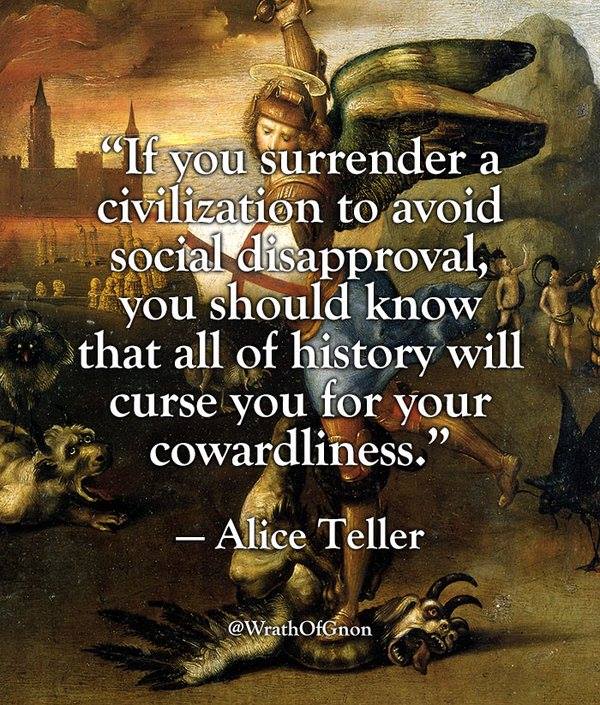
Peter Hitchens - Britain Should Defend Its Christian Culture
 Embryo Parson Posted on
Embryo Parson Posted on  Monday, February 15, 2016 at 03:36PM
Monday, February 15, 2016 at 03:36PM From one of Anglicanism's finest political commentators.
Class Notes and Videos for Inquirers - St. Matthew's Anglican Catholic Church
 Embryo Parson Posted on
Embryo Parson Posted on  Thursday, February 11, 2016 at 12:46PM
Thursday, February 11, 2016 at 12:46PM Added to my sidebar. Highly recommended for people curious about the Anglican Way.
"Those who make peaceful revolution impossible will make violent revolution inevitable." - John F. Kennedy
 Embryo Parson Posted on
Embryo Parson Posted on  Tuesday, February 9, 2016 at 03:15PM
Tuesday, February 9, 2016 at 03:15PM Yet more evidence of the growing angst in Europe over the prospect of civil war:
-- Warns (sic) of civil wars and chaos
-- Britain warned to expect far-right ‘violence’ as anti-Muslim hatred becomes ‘mainstream’. (Now there's an unbiased title of an article for you. :) )
Blessing of the Harleys
 Embryo Parson Posted on
Embryo Parson Posted on  Tuesday, February 9, 2016 at 02:44PM
Tuesday, February 9, 2016 at 02:44PM Two things:
1) This is one reason among many that I'm a trad Anglican. It's earthy, the furthest thing from gnosticism;
2) My wife and I intend to retire soon in this area of the country (Western North Carolina). I just may have to look up this church. (St. Patrick's Anglican, APA).
The Fury of the Nations
 Embryo Parson Posted on
Embryo Parson Posted on  Sunday, February 7, 2016 at 06:16PM
Sunday, February 7, 2016 at 06:16PM Read the lines. And between the lines. War is coming to Europe.
Pitchfork Time? "Elites Have Lost Their Healthy Fear Of The Masses".
Laurence Auster on the "Babylonian Impulse" vs. the Biblical Doctrine of Nations
 Embryo Parson Posted on
Embryo Parson Posted on  Sunday, February 7, 2016 at 05:03PM
Sunday, February 7, 2016 at 05:03PM When I was in seminary I belonged to a Christian apologetics and activist organization called Christian Research Associates. One of the things I developed for the organization was a lecture on the New Age Movement that analyzed the movement historically and theologically. In the course of my research, I happened upon a number of sources pertaining to the spiritual and social meaning of the Babylonian ziggurat, both to the ancient Babylonians and to modern occultists who have made use of it in their writings. The text of Genesis 11: 1-9 is the account of prototypical ziggurat - the Tower of Babel - as interpreted theologically by its Hebrew author.
I have referred to the beliefs and activism of certain New Age liberals, modern humanists, and political elite with respect to the creation of a one-world government as the "Babylonian Impulse", hence my use of the term in the title of this blog entry.
Several years ago I was pleased to find that the late traditionalist conservative writer Laurence Auster was thinking similarly about the Babylonian Impulse, as evidenced in a two-part article he wrote for Front Page Magazine entitled, How Liberal Christianity Promotes Open Borders and One-Worldism. For those of you unfamiliar with Auster, he was a Jew who converted to Anglican Christianity (Episcopal Church), and later to Roman Catholicism, whose writings focused mainly on immigration and the heresy of multiculturalism.
Yes, I say the "heresy" of multiculturalism, because as Auster shows in this article, and as these writers have opined, multiculturalism stands in opposition to the biblical doctrine of nations, the center of which is arguably the Genesis text cited above. God means to keep nations separate. In the Genesis text, the borders are linguistic; in other biblical texts, the borders are physical, and nothing about the New Covenant or the catholicity of the Church changes any of this.
As indicated by the title of his article, Auster's focus is on liberal Christianity, which of course is a fellow traveler with New Age liberals, modern humanists, and the political elite. But Auster turns his sights on the Church of Rome as well, because of its irresponsible -- and yes, heretical -- multiculturalism. Here is the salient section of the article about the Babylonian Impulse:
The above thoughts lead to a surprising conclusion. Most liberal Christians today affirm that creating culturally diverse societies is the moral, Godly, and just thing to do—the more diverse, the more just and Godly. But if it is our purpose to discern God's purpose, doesn't it seem far more likely that God would oppose the creation of multicultural, majority-less societies? He would oppose them, first, because they rob human beings of the stable cultural environments and the concrete networks of belonging that are essential conditions of personal and social flourishing; and, second, he would oppose them because they lead to unresolvable conflict and disorder. In opening America's borders to the world, our political leaders are not following any divine scheme, but are indulging an all‑too‑human conceit: "We can create a totally just society," they tell themselves. "We can stamp out cultural particularities and commonalities that have taken centuries or millennia to develop. We can erect a new form of society based on nothing but an idea. We can ignore racial and cultural differences and the propensity to inter‑group conflict that has ruled all of human history. We can create an earthly utopia, a universal nation."
All of which brings us to the biblical account of Babel. The comparison of multicultural America to the Tower of Babel has become such a cliché in the hands of conservative columnists over the last 20 years that a true understanding of this parable has been lost. Indeed, as I will show, the conservative, or rather the neoconservative, understanding of this parable is the exact opposite of its true meaning.
As told in the eleventh chapter of Genesis, the human race, in a burst of arrogant pride, attempts to construct a perfect human society purely by their own will—a tower "with its top in the heavens, and let us make a name for ourselves, lest we be scattered abroad upon the face of the whole earth." Mankind hopes that this one‑world society will prevent them from being divided into separate societies. But this is not what God wants. "The Lord came down to look at the city and tower which man had built, and the Lord said, 'If, as one people with one language for all, this is how they have begun to act, then nothing that they may propose to do will be out of their reach.'" God does not want man to build a universal city, because that would lead man to worship himself instead of God. So God confuses—that is, he diversifies—men's language so that they cannot understand one another, and then he "scattered them abroad over the face of all the earth."
It becomes clear that the Tower of Babel is not, as neoconservatives have often said, a multicultural society which breaks down because it lacks a common culture based on universalist ideals. On the contrary, the Tower of Babel represents the neoconservatives' own political ideal—the Universal Nation. And the moral of the story is that God does not want men to have a single Universal Nation, he wants them to have distinct nations. "That is why it was called Babel," Genesis continues, "because there the Lord confounded the speech of the whole earth." But that's not all. Having divided men's language into many different languages, God does not want these many languages to co‑exist in the same society: "And from there the Lord scattered them over the face of the whole earth."
Thus God rejects the universal society, where the whole human race lives together speaking the same language, and he also (implicitly) rejects the multicultural society, where the whole human race lives together speaking different languages. God wants the human race to belong to a plurality of separate and finite societies, each with its own culture and language. This providential system for the organization of human life allows for the appropriate expression of cultural variety, even as, by demonstrating that human things are not absolute, it restrains and channels man's self-aggrandizing instincts.
And this view of mankind is not limited to the Book of Genesis, as a supposedly primitive account of an early, tribal period of history when mankind presumably needed a more rudimentary form of social organization. If we go from the first book of the Bible to its last book, The Revelation of John, we find, to our astonishment, that God's plan still includes separate nations. In Chapter 21, after the final judgment on sinful humanity has occurred, after the first heaven and the first earth have passed away and a new heaven and a new earth have appeared, after the holy city, New Jerusalem, has come down out of heaven, a dwelling for God himself on earth, and after the total transformation of the world, when even the sun and moon are no longer needed to light the city because the glory of God is the light of it, and the Lamb is the lamp of it, even then
... the nations of them which are saved shall walk in the light of it: and the kings of the earth do bring their glory and honour into it....
And they shall bring the glory and honour of the nations into it.
In the New Jerusalem, the heavenly city, there are still distinct nations, and kings of nations, and these are the glories of humanity which are brought before the throne of God, and there transfigured in the light of Christ. Mankind, following the end of the world, is still providentially constituted of separate nations, which give it its character and distinctiveness, even as, for example, our earth is constituted of separate continents, islands, mountain ranges, and valleys, which give it its shape and its meaning. The physical earth is not a homogenous mass consisting of nothing but "equal" individual particles, and neither, in the biblical view, is mankind.
Very sound ethno-theology, this. We need to stop shying away from it for fear of being called "racists." The Church is to evince more courage than that.
For the full article:
How Liberal Christianity Promotes Open Borders and One-Worldism (Part I)
How Liberal Christianity Promotes Open Borders and One-Worldism (Part II)
On Anglican Catholicity
 Embryo Parson Posted on
Embryo Parson Posted on  Friday, February 5, 2016 at 01:21PM
Friday, February 5, 2016 at 01:21PM To that heaven which belongs to the catholic church, I shall never come, except I go by the way of the catholic church, by former Ideas, former examples, former patterns, to believe according to ancient beliefs, to pray according to ancient forms, to preach according to former meditations. - John Donne, The Works of John Donne, Vol.3, Sermon LXVI
Amen
 Embryo Parson Posted on
Embryo Parson Posted on  Friday, February 5, 2016 at 01:06PM
Friday, February 5, 2016 at 01:06PM The pacifists are wrong, and that's all there is to it.
If we cannot produce Launcelots, humanity falls into two sections - those who can deal in blood and iron but cannot be "meek in hall", and those who are "meek in hall" but useless in battle - for the third class, who are both brutal in peace and cowardly in war, need not here be discussed. When this dissociation of the two halves of Launcelot occurs, history becomes a horribly simple affair. . . . The man who combines both characters - the knight - is not a work of nature but of art; of that art which has human beings, instead of canvas or marble, for its medium.
In the world today there is a "liberal" or "enlightened" tradition which regards the combative side of man's nature as a pure, atavistic evil, and scouts the chivalrous sentiment as part of the "false glamour" of war. And there is also a neo-heroic tradition which scouts the chivalrous sentiment as a weak sentimentality, which would raise from its grave (its shallow and unquiet grave!) the pre-Christian ferocity of Achilles by a "modern invocation". . . .
(However), there is still life in the tradition which the Middle Ages inaugurated. But the maintenance of that life depends, in part, on knowing that the knightly character is art not nature - something that needs to be achieved, not something that can be relied upon to happen. And this knowledge is specially necessary as we grow more democratic. In previous centuries the vestiges of chivalry were kept alive by a specialized class, from whom they spread to other classes partly by imitation and partly by coercion. Now, it seems, the people must either be chivalrous on its own resources, or else choose between the two remaining alternatives of brutality and softness. . . . The ideal embodied in Launcelot is "escapism" is a sense never dreamed of by those who use that word; it offers the only possible escape from a world divided between wolves who do not understand, and sheep who cannot defend, the things which make life desirable. . . . (C.S. Lewis, "The Necessity of Chivalry".)
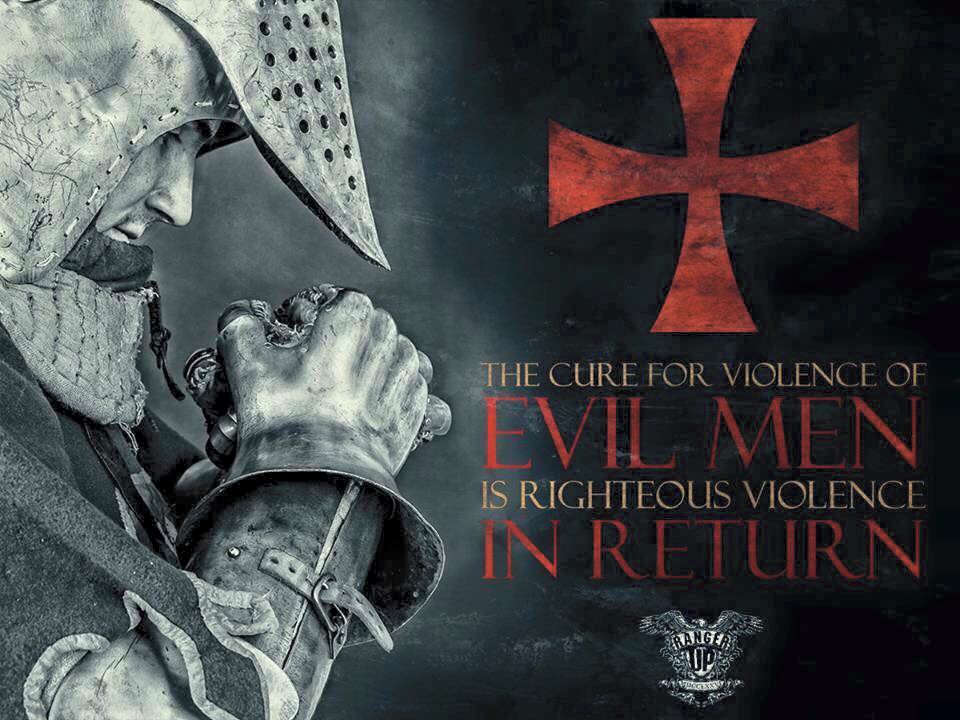
Fear and Trembling: My First Foray Into "Ethno-theology"
 Embryo Parson Posted on
Embryo Parson Posted on  Wednesday, February 3, 2016 at 07:12PM
Wednesday, February 3, 2016 at 07:12PM Fear and trembling because of the very real prospect of being misunderstood. But a foray it must be, since present realities in Western Europe and the Anglosphere will eventually compel the Church to open up a frank and serious, which is to say platitude-free, discussion about it.
First, from an Orthodox perspective, and as Anglicanism like Orthodoxy is organized along national lines, of special interest to us: Orthodox Ethno-Theology and the Forced Demographic Replacement of Eastern Europe;
Next, a better-quality article written from a Reformed perspective: A Biblical Defense of Ethno-Nationalism;
Lastly, an excellent cautionary article from Aaron Wolf at Chronicles magazine: Incidentally White.
Is there a "biblical doctrine of nations"? The platitudinous, politically correct answer is "no". Since I've so described the "no" answer, you'll know what my answer is. If I'm right, it's time we start talking about it. By my lights, it is eminently possible to answer "yes" and not commit oneself to a racist position.
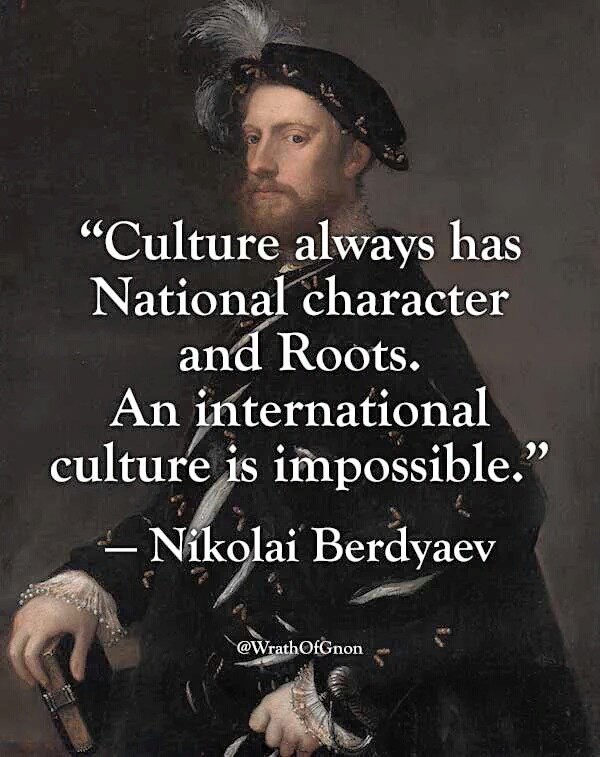
A Blessed Candelmas to All
 Embryo Parson Posted on
Embryo Parson Posted on  Monday, February 1, 2016 at 10:12PM
Monday, February 1, 2016 at 10:12PM Music video courtesy of Fr. Jonathan Munn.
Two Related Articles
 Embryo Parson Posted on
Embryo Parson Posted on  Thursday, January 28, 2016 at 11:41PM
Thursday, January 28, 2016 at 11:41PM The Early Church on War and Killing
 Embryo Parson Posted on
Embryo Parson Posted on  Thursday, January 28, 2016 at 11:19PM
Thursday, January 28, 2016 at 11:19PM 




